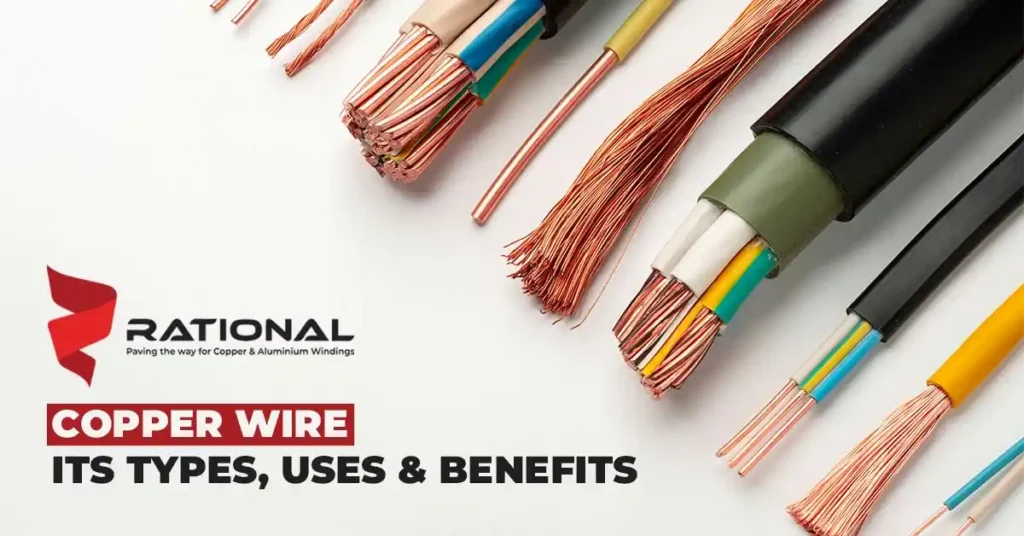Copper is an indispensable metal, used abundantly in electric wiring for both domestic and electric purposes and decorative wirework. Copper wire from companies like Rational Engineers is used for its high conductivity and strength. Being such an important part of an electrical system, many people are not aware of its different types; how they differ from one another, and their uses.
In this blog, we will explore different types of copper wires, their properties, and their uses. You don’t have to be a professional to gain knowledge about them as this is a crucial part of your domestic wiring and communication networks.
Why is Copper wire preferred over other types of wires?
1. High Conductivity and Resistance
Copper wire is known for its high conductivity and resistance. These are also capable of handling heavier loads of electricity as compared to non-precious metals. Electricity passes through it easily. Copper also has higher resistance power to heat and rusting and this makes it desirable for marine appliances and underwater equipment.
2. Ductile and Malleable
The copper wires are even thinner than human hair. They can be easily twisted and bent as required, without the danger of splitting. It is used in electric posts and in headphone wires, to make thick electric wires.
3. High Melting Point
Copper has a very high melting point. It can withstand high temperatures and doesn’t melt easily.
4. High Tensile Strength
Copper has a high tensile strength and can resist several mechanical failures. Therefore, copper is preferred over aluminum.
5. Solderability
Copper wires can make connections easy for transmission and termination points. They can be pulled through different areas due to their strength.
Types of Copper Wires
There are various types of copper wires. The Copper Wire Manufacturers produce and mold them according to the requirements and applications.
1. Solid Copper Wire
This type is the most commonly used type of copper wire. Known for its durability and reliability, a single copper wire, bare or sheathed, in an insulating cover can be used to transfer electricity.
Solid Copper Wire Uses –
Residential Wiring: It is usually found in domestic applications – connecting outlets, switches, and light fixtures.
Commercial Wiring: It is also used in commercial buildings for wiring electrical systems, such as offices and industrial facilities.
2. Stranded Copper Wire
Numerous thin copper wires are wound together to form a single wire, called a stranded copper wire. It is used where there are fluctuating electrical loads.
These are color-coded for easy identification. The number of strands and thickness of each strand determines the overall gauge of the wire. A higher strand count generally results in more flexible wire.
Stranded Copper Wire Uses –
Industrial applications: It is commonly used in industries with fluctuating electrical loads, such as manufacturing plants and machinery.
Automotive Wiring: In automotive applications, where flexibility is important due to the movements and vibrations of the vehicle, stranded copper cable is used.
3. Tinsel Copper Wire
It is a type that is made up of thin strands of copper wire wrapped in polyester film. This provides a high level of flexibility, making it suitable for applications that require movement and bending. The tinsel wire is mostly used in headphones and mobile devices, where flexibility and high durability are crucial.
Tinsel Copper Wire Uses –
Portable electronics: Tinsel copper cables are commonly used in constructing headphone cables, earphones, and other portable devices.
Medical Devices: Medical equipment that requires flexibility, like monitoring devices and diagnostic tools, requires tinsel copper wiring.
4. Braided Copper Wire
It consists of multiple strands of copper wire braided together. It is ideal for applications that require strength and flexibility. It provides electric conductivity and can withstand harsh operating conditions.
Braided Copper Wire Uses –
Automotive Industry: It is used in automotive applications including battery cables and grounding systems.
Electronic devices: It is also used in electronic devices such as computers and televisions where flexibility and durability are crucial.
5. Copper Clad Aluminum Wire
It has an aluminum core coated with a thin layer of copper. It combines the conductivity of copper and the light-weightedness and cost-effectiveness of aluminum. It is used in applications where cost is a significant factor.
Copper Clad Aluminum Wire Uses –
Low-cost electrical wiring: It is used in residential and commercial electric wiring where cost-effectiveness is a priority.
Low-voltage applications: It is also used in low-voltage applications, such as audio systems and telecommunications.
6. Bare Copper Wire
This type doesn’t have any insulation or coating. It is cost-effective and widely available. It offers excellent electrical conductivity.
Bare Copper Wire Uses –
Electrical grounding: It is commonly used for electrical grounding applications, where it provides a low-resistance path for electrical currents.
Craft and DIY Projects: It is popular amongst DIY enthusiasts for various artistic projects.
Some Other Types of Copper Wire
7. Beryllium Copper Wire
It combines the high strength of copper with non-magnetic and non-sparking qualities. These utilized components find their applications in the domain of electronics, electromechanical systems, and the medical sector. It displays superior electrical conductivity with remarkable resistance against corrosion.
8. Copper Alloy Wire
This type of wire is accessible to both standard and customized configurations. It is available in various forms, like zirconium, brass, bronze, and titanium.
9. Titanium Clad Copper Wire
Titanium Clad Copper Wire is renowned for its outstanding conductivity, particularly in corrosive environments. It is suitable for applications in desalination, power generation, and chemical processing.
10. Oxygen Free Highly Conductive Copper Wire
This type goes through a process to minimize the oxygen content. This enhances its electrical conductivity and operational strength. Also, its malleability allows for precise machining into different shapes.
Conclusion
Copper wire is an essential component of the electrical system. Understanding the different types can help you select the right one as per your requirements.
Rational Engineer, the largest copper wire manufacturer, offers a wide range of copper wire products. Our expertise and commitment to quality make us a trusted supplier in the industry.

